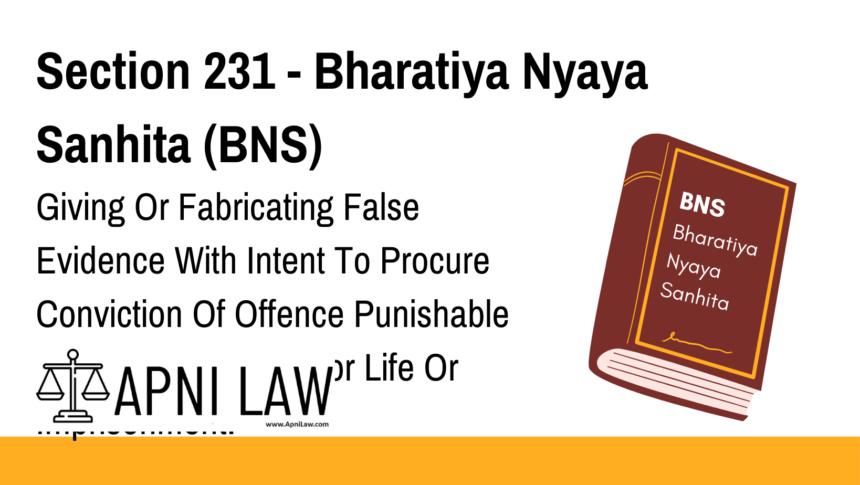Code: Section 231 BNS
Whoever gives or fabricates false evidence intending thereby to cause, or
knowing it to be likely that he will thereby cause, any person to be convicted of an
offence which by the law for the time being in force in India is not capital, but punishable
with imprisonment for life, or imprisonment for a term of seven years or upwards, shall be
punished as a person convicted of that offence would be liable to be punished.
Illustration.
A gives false evidence before a Court, intending thereby to cause Z to be convicted
of a dacoity. The punishment of dacoity is imprisonment for life, or rigorous imprisonment
for a term which may extend to ten years, with or without fine. A, therefore, is liable to
imprisonment for life or imprisonment, with or without fine.
Explanation of Section 231 BNS
Section 231 of the Bharatiya Nyaya Sanhita (BNS) deals with the serious offense of providing or fabricating false evidence that could lead to the conviction of another person for an offense punishable with:
- Imprisonment for life, or
- Imprisonment for a term of seven years or more.
Key Provisions:
- False Evidence Leading to Severe Punishment:
- If a person gives or fabricates false evidence that causes another to be convicted of an offense punishable by life imprisonment or imprisonment for seven years or more, the false witness will receive the same punishment as the wrongfully convicted person.
- Punishment is Equal to the Offense Wrongly Imposed:
- If a false witness’s actions cause someone to be convicted of dacoity (punishable by life imprisonment or up to 10 years), the false witness will face life imprisonment or up to 10 years of rigorous imprisonment.
- Objective of the Law:
- This provision is intended to prevent wrongful convictions based on false evidence and deter false witnesses from manipulating judicial proceedings.
- Related Provisions:
- Section 230 BNS – False evidence leading to conviction in capital offenses.
- Section 232 BNS – Destruction of documents to prevent their use as evidence.
Illustration
Example 1: False Evidence in a Dacoity Case
A falsely testifies in court, leading to Z’s conviction for dacoity, which is punishable by life imprisonment or rigorous imprisonment for up to 10 years. Later, it is proven that A fabricated the evidence. Under Section 231 BNS, A will receive the same punishment as Z would have—either life imprisonment or up to 10 years in prison.
Example 2: False Testimony in a Rape Case
B knowingly gives false testimony in a rape case, leading to X’s wrongful conviction. Since the punishment for rape is life imprisonment or imprisonment of 10 years or more, B will face the same penalty as X.
Common Questions and Answers on Section 231 BNS
1. What is the punishment for giving false evidence under Section 231 BNS?
- The person who fabricates false evidence will be punished with the same penalty as the offense they falsely accused someone of.
2. Does this law apply to non-capital offenses?
- Yes, Section 231 BNS applies only to offenses punishable with life imprisonment or imprisonment of seven years or more, not capital offenses.
3. How is the punishment determined under this section?
- The false witness receives the exact same punishment that would have been imposed on the wrongfully convicted person.
4. Can a false witness escape liability if the wrongful conviction does not happen?
- No, even if the false evidence does not result in a conviction, the person who fabricates such evidence can still be prosecuted under related laws for attempting to pervert the course of justice.
5. Is there any legal remedy for a person wrongfully convicted due to false evidence?
- Yes, if a person is wrongfully convicted based on false evidence, they can seek appeal or revision, and the false witness can be prosecuted under Section 231 BNS.
Conclusion
Section 231 BNS is a crucial legal provision aimed at deterring individuals from providing or fabricating false evidence that could lead to wrongful convictions. This law serves as a deterrent against perjury and protects the integrity of the justice system.
For more legal insights, visit ApniLaw today! 🚀











